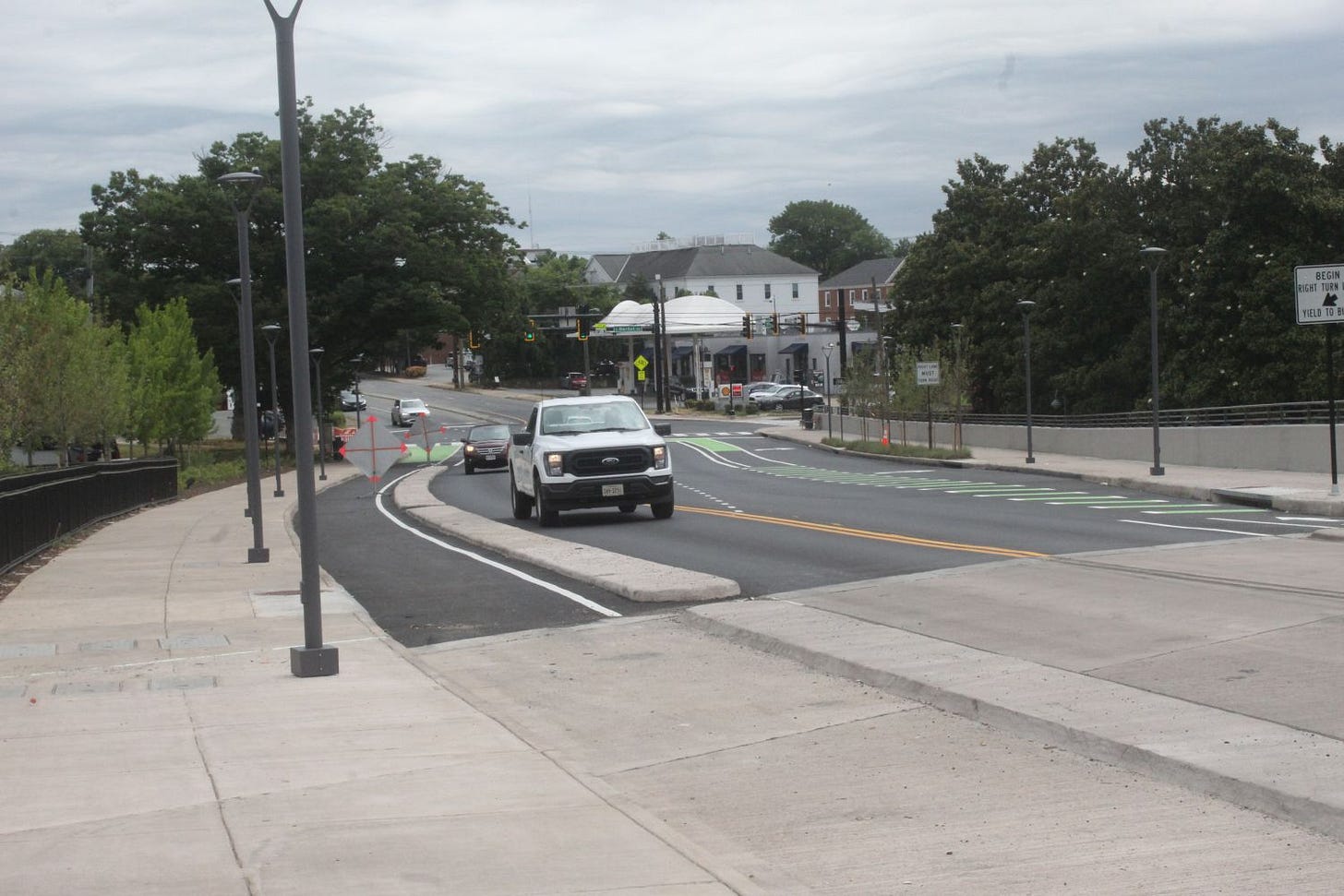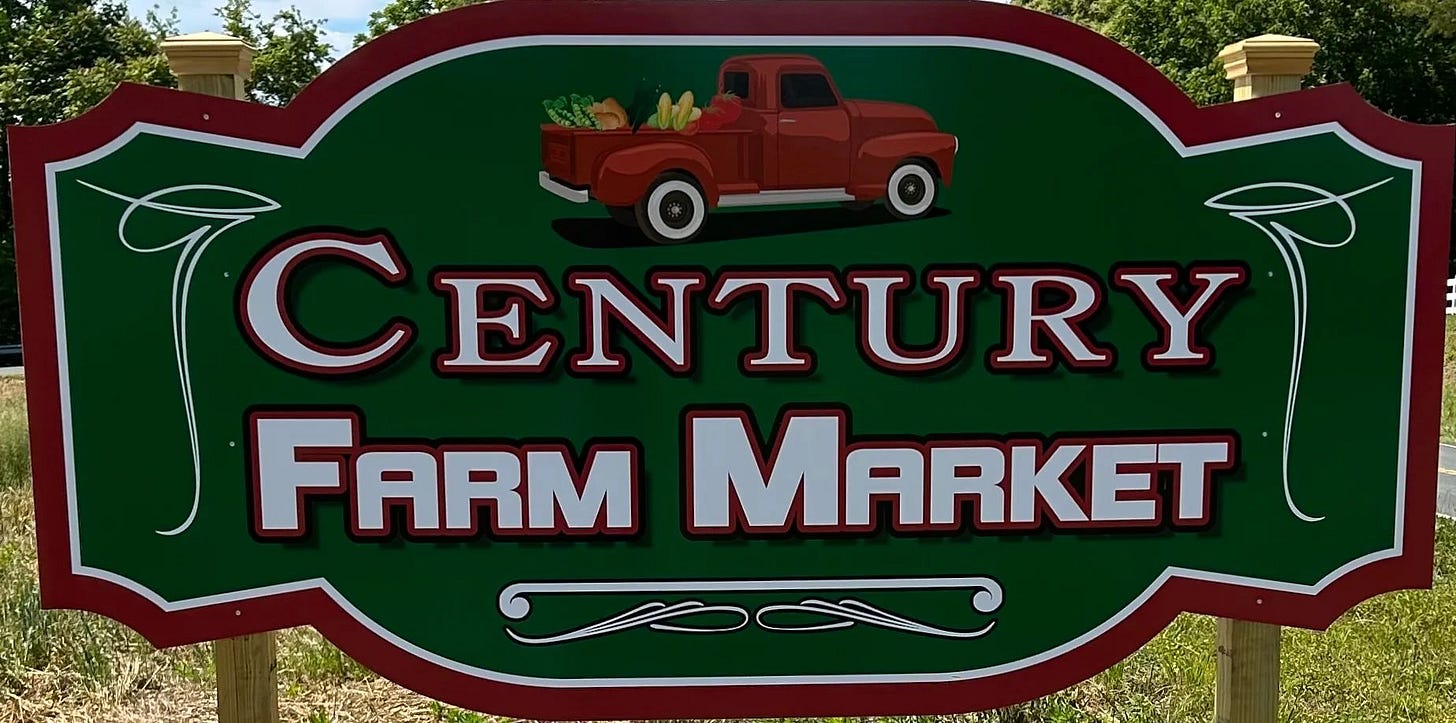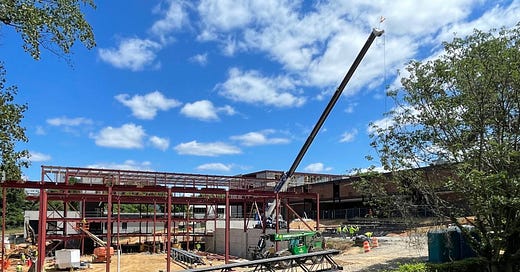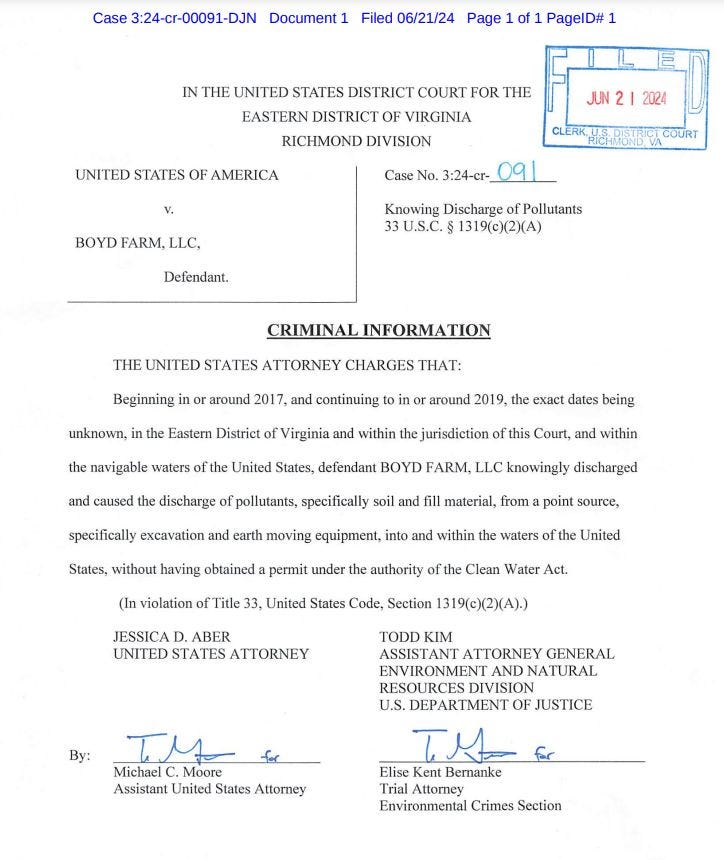July 1, 2024: Charlottesville celebrates "topping off" at Buford Middle School, ribbon-cutting for Belmont Bridge
Plus: Governor Youngkin appoints five people to the UVA Board of Visitors
Happy Fiscal Year 2025! This is the first day for municipal budgets across the Commonwealth of Virginia as well as the halfway point through the calendar year. This is Charlottesville Community Engagement for this day which isn’t really much of a holiday unless you’re in Canada, which I have not been for nearly 24 years now. I’m Sean Tubbs, and there’s a good chance this newsletter is the 698th edition.
In today’s installment:
Charlottesville celebrates a construction milestone for new structures at Buford Middle School as well as the ribbon-cutting for the Belmont Bridge
Governor Glenn Youngkin has appointed five people to the University of Virginia’s Board of Visitors
Two agricultural operations in the area have received infrastructure funds from the Commonwealth of Virginia
A Central Virginia agricultural operation is fined $300,000 for violations of the Clean Water Act
First-shout: Charlottesville Area Tree Stewards taking applicants for next class
In today’s first subscriber-supported shout-out: Have you ever wanted to become an expert in trees? A good way to do that is to learn to become a volunteer with the Charlottesville Area Tree Stewards.
The group is currently taking applications for its tree steward training program which will run from August 6 to November 16 in a mixture of online and live classes. Those selected will learn about planting and pruning trees as well as removing invasive plants in local parks and woodlands. The training is open to residents of Charlottesville, Albemarle, Greene, Fluvanna, Nelson, and Louisa and those who go through the program are asked to give 25 hours of their time each year.
Interested? Visit charlottesvilleareatreestewards.org to learn more including the class schedule and tuition information!
Two major projects in Charlottesville cross major milestones
For many fiscal years, the renovation of Buford Middle School and the replacement of the Belmont Bridge were theoretical projects with hours of meetings debating the right way to proceed.
Last week, Charlottesville Mayor Juandiego Wade presided over both the “topping out” ceremony for new structures that will be part of the renamed Charlottesville Middle School as well as the ribbon-cutting for the mostly finished Belmont Bridge.
Wade was a member of the School Board from 2006 to 2021 and was on the School Board when the architectural firm VMDO was hired to implement a long-planned expansion to add enough room for sixth-graders to attend.
“We got here to this point because VMDO, City Council, and the School Board, they listened,” Wade said at the Buford event. “They listened to what we had to say but more importantly they listened to what the students and residents had to say and I think that’s the only way we can move forward as a city.”
Wade thanked the construction crews working for the firm Nielsen for working in the heat to build the school. (Special thanks to Maggie Glass and 29NBC for providing audio from the event)
Twenty-one hours later, Wade was on hand to commemorate the official opening of the third bridge to cross the railroad trucks on the eastern end of Downtown Charlottesville.
The total cost for the project is $38 million according to the Virginia Department of Transportation’s Six-Year Improvement Program with $33.8 million of that in construction.
“Belmont Bridge is a gateway into downtown,” said Steven Hicks, the city’s public works director. “This project is a major investment that will last a hundred years.”

Planning for this replacement has been underway since late 2008 when a cost-benefit analysis indicated a new structure would be more effective in the long run. Planning got underway but hit a snag when a campaign began to build an at-grade intersection or an underpass instead.
Council finally agreed to proceed with a bridge replacement in July 2014 but then the firm hired to design and build the bridge went out of business. The project lay dormant for a couple of years until the city hired the firm Kimley-Horn to begin the planning process from scratch.
“The opening of the bridge that we are part of today was not designed just to use move vehicles but was designed to provide multimodal access to public transportation that specifically integrates bicycling and walking,” Hicks said.
At 267 feet in length and 62 feet wide, the new bridge is shorter than the previous bridge from 1962 and includes a protected bike lane on the western side.
“We created an innovative and architectural design and the bridge has a separated pedestrian, vehicle, and bicycle lanes,” Hicks said. “Two eleven-foot travel lanes, one in each direction. Seven foot bike lanes and ten foot pedestrian lanes. And we preserved the views to the mountains and of the railroad tracks.”

The city also got a waiver from the Buckingham Branch Railroad to not have to install a fence to stop people from throwing items onto the tracks.
The bridge was built by Caton Construction and there is a list of remaining items that need to be completed. Hicks said he did not have time to thank all of the workers but was able to describe what material went into the bridge.
“They installed 535,000 pounds of reinforcing steel, poured 158 tons of structural concrete, installed eight miles of underground electrical wire and fiber optic cable, constructed 23,000 square feet of retaining wall, and moved ten million pounds of aggregate and laid more than 80 million pounds of asphalt,” Hicks said.
Mayor Wade said he could get use to such ceremonies and that the two events together show a new direction for the city. He said for many years he felt the bridge would never be replaced.
“This is proof that Charlottesville, we can get things done as we work together as a community, when we work together as the public to get input to get the design that you want,” Wade said.
The bridge planning did not start on City Manager Sam Sanders’ watch but the completion of the project is the first major infrastructure project the city has delivered in some time. He understands there is pessimism against the city’s ability to get things done.
“I want to change that,” Sanders said. “I want to make sure that we don’t spend too much more time thinking about what won’t happen in the city and what can happen in the city.”
Sanders said another example will be the creation of a sidewalk priority list that Council will discuss later on today.
Youngkin makes five appointments to the UVA Board of Visitors
Five new people will join the appointed body that perhaps makes the most important decisions in the Charlottesville area. Governor Glenn Youngkin selected five people to the University of Virginia’s Board of Visitors on Friday night in time for new terms that begin today.
Three of the appointees are Virginia residents and two are out of state residents. One lives in nearby. Three graduated from UVA with economics degrees.
Daniel M. Brody of Albemarle County is the founder and president of Health Data Services, Inc. According to the Virginia Public Access Project, Brody contributed a total of $80,000 to Youngkin’s campaign, his inaugural committee, and his political action campaign. He is a 1973 graduate of the College of Arts & Sciences with a degree in economics. According to his biography on the Brody Jewish Center’s website, he’s also involved in residential development in Albemarle County.
Marvin W. Gilliam, Jr., of Bristol, Virginia had been appointed to a second term ten years after his first expired. According to the Wellspring Foundation of Southwest Virginia, Gilliam is the head of MAM Development and a former partial owner of Cumberland Resources Company, a coal company. Like Brody, he also obtained an economics degree. Gilliam has contributed a total of $150,000 to Youngkin’s Spirit of Virginia PAC and $120,000 to the Youngkin campaign.
David Okonkwo, MD, PhD of Pittsburgh, Pennsylvania is a Professor of Neurological Surgery at University of Pittsburgh where he is director of the Neurotrauma Clinical Trials Center. Okonkwo earned his undergraduate degree at UVA before getting a master’s and a doctorate at Virginia Commonwealth University. He completed his neurosurgical residency at the UVA Medical Center. According to his biography on the website for UPMC Enterprises, Okonkwo is also team neurosurgeon for the Pittsburgh Steelers.
David F. Webb of Virginia Beach is the Vice Chairman with CBRE’s Capital Markets Group. CBRE bills itself as “the global leader in commercial real estate services and investment.” Webb leads a group called the “Mid Atlantic Debt & Structured Finance Team” which includes several development projects in Washington D.C. and Northern Virginia. Webb also has a B.A. in Economics from the University of Virginia and a J.D. from the T.C. William School of Law at the University of Richmond. Webb donated $35,000 to Youngkin’s Spirit of Virginia PAC.
Porter Wilkinson of Bethesda, Maryland is the counselor and chief of staff at the Smithsonian Institute Board of Regents. According to her bio, she has served as law clerk to Chief Justice John G. Roberts Jr. and also served in that position then Justice Brett Kavanaugh was on the U.S. Court of Appeals for the D.C. Circuit. Wilkinson earned her undergraduate degree from the University of North Carolina and her law degree from the UVA School of Law.
The terms of Mark T. Bowles, Elizabeth M. Cranwell, Thomas A. DePasquale, and Babur B. Lateef, M.D. and Jim Murray expired at the end of June.
The next scheduled meeting of the Board of Supervisors is September 13 through September 14. (BOV meeting page)
Second shout out: Rivanna River Forest Health & Resilience Project
Have you ever noticed a tree or an entire forest smothered in vines and wondered what is going on? It’s likely that an invasive species has taken over and tree health is in danger. Several groups in our community are doing what they can to push back pockets of invasives, but a partnership is working this summer to take a broader look.
The Rivanna River Forest Health and Resilience Project is funded through the National Fish and Wildlife Foundation. The idea is to improve the ecology along the urban Rivanna River through planting of native trees and identifying high-risk spots. The scope is the five miles of waterway from the confluence of the North Fork and South Fork down to Moores Creek. Led by the Rivanna Conservation Alliance, this summer will see the creation of forest resilience management plans for three urban parks.
To learn more, visit the Rivanna Conservation Alliance website at rivannariver.org.
AFID grants to help create mobile honey processing unit, additional refrigeration for Lake Anna farm market
Two area agricultural companies have received funding from the Commonwealth of Virginia to assist with new purchases to grow their business.
Last week, Governor Glenn Youngkin announced the latest round of Agriculture and Forestry Industries Development grants which are used to purchase equipment or otherwise invest in their operations.
“This round of funding includes producers in meat processing, dairy processing, canning, honey production, and farmer’s markets,” reads a press release sent out Friday.
The source is the Virginia Department of Agriculture and Consumer Services.
Century Farm Market of Louisa County will get $17,650 to improve freezer and refrigerator capacity. They raise their own beef and sell products for other local farms in the area.

The Siller Pollinator Company in Albemarle County and Fluvanna County will receive $26,000 to create a mobile honey processing facility for area beekeepers who want to develop products such as wax, infused honey, and creamed honey.
Could the above project refer to “Project Bee Friend” that the Albemarle County Economic Development Authority went into closed session for on February 15, 2022? (read the resolution)
AFID grants usually require a match or involvement with a locality. For instance, Potter’s Craft Cider received an AFID grant in 2019 that helped lead to the development as Neve Hall as their tasting room and production facility.
Elsewhere in the Fifth District, Prince Edward Cannery and Virginia Food Works will upgrade processing equipment in their shared facility using a $28,000 grant.
Across the mountains in the Shenandoah Valley, the City of Buena Vista and the Advancement Foundation secured $50,000 for the Virginia Innovation Accelerator Commercial Kitchen to “serve as a business incubator focused on agricultural innovation.”
In December 2022, Governor Youngkin awarded $50,000 to the New Hill Development Corporation toward their commercial kitchen that’s part of the Black Entrepreneurial Advancement and Community Opportunity Network (BEACON). Council also contributed $500,000 to the project in the spring of 2023.
Do you have an idea for a project you would like to see funded?
“The next semi-annual infrastructure grant round will be open for applications on October 1 through November 15, 2024, while planning grant applications are accepted on a rolling basis,” reads the press release.
Central Virginia property owner to pay $300K for Clean Water Act violations
Since 1972, the U.S. Clean Water Act has set a framework that seeks to preserve the health of water by restricting pollutants that enter the ground or waterways. That includes wetlands and streams.
Last week, the owner of an agricultural operation in Central Virginia was sentenced in the United States Eastern District Court for a violation of the act.
“Beginning in or around 2017, and continuing to in or around 2019… defendant BOYD FARM, LLC knowingly discharged and caused the discharge of pollutants, specifically soil and fill material, from a point source. specifically excavation and earth moving equipment, into and within the waters of the United States, without having obtained a permit under the authority of the Clean Water Act,” reads a briefing filed by the U.S. Attorney’s office on June 21.
On Friday, the Eastern District Attorney’s office announced Frazier T. Boyd III was sentenced on June 26 to pay a $300,000 fine for a felony violation of the Clean Water Act. He was also sentenced to 30 days of home confinement and a year of probation.
The violations occurred at three sites according to the release including one in Louisa County. The case built after the U.S. Environmental Protection Agency notified Boyd and Boyd Farm in 2015 ordering the restoration of impact wetlands, but the violations kept occurring with workers placing debris and dirt into streams on three properties.
“Unpermitted discharges like these can destroy habitat and degrade the pollution cleaning function of wetlands,” the release continues. “The United States does issue permits to fill wetlands under some conditions. Boyd Farm and Boyd knew of the requirement for these permits but did not seek or obtain them for any of their properties.”
Reading material:
27 new firefighters graduate from ACFR, Pimm Dyar, CBS19 News, June 27, 2024
Carlton Mobile Home Park residents fear losing their homes as news arrives that the park will be sold, Erin O’Hare, Charlottesville Tomorrow, June 28, 2024
It’s OK to ban homeless people from camping in public, high court rules, Route 50, Daniel C. Vock, June 28, 2024
Albemarle County family loses home in Friday residential structure fire, Chris Graham, Augusta Free Press, June 29, 2024
#698 welcomes you to Fiscal New Year 2025!
I had wanted to do a segment today listing all of the new items in the budgets that go into effect today, but there are so many stories I have to get to and plan to get to this week. It’s a slower week than usual, and I plan to work and continue to get stories. That’s the best way I can think to mark the 248th anniversary of the Declaration of Independence. This country is where I’ve spent all but one of my years and I do this work to try to make it a better place.
I think this could be a better place if more people knew what was happening in local and regional economies, which includes what governments do. For some reason, doing this work appealed to me for a young age and I opted to keep my focus on the community level.
That has meant focusing on Charlottesville which I’ve done for quite a long time now. Thanks to paid subscribers I’m hoping to continue doing so. I didn’t quite make it to all of my personalized thank you notes for those who paid up in June, but I’ll get there. All of your support is very welcome and crucial to this work continuing.
Ting will match your initial subscription, whether it be at $5 a month, $50 a year, or $200 a year. It is quite generous of them to do so, and I appreciate their investment in this style of community journalism.
Ting can help you with your high speed Internet needs. If service is available in your area and you sign up for service, enter the promo code COMMUNITY and you will get:
Free installation
A second month for free
A $75 gift card to the Downtown Mall









